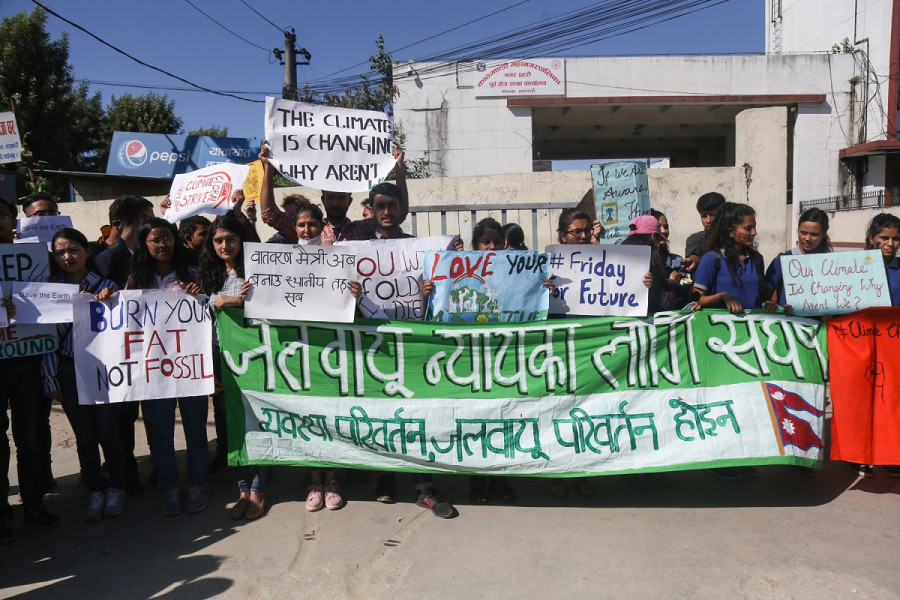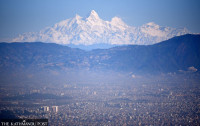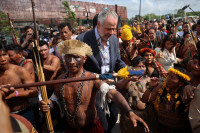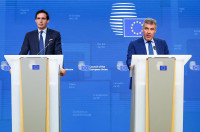Climate & Environment
Nepal receives over Rs 3 billion from Green Climate Fund for climate action
The second significant financial support from the GCF within a year has given hope for accessing additional climate finance in the future.
Chandan Kumar Mandal
Nepal has secured yet another significant funding from the Green Climate Fund (GCF) to support the country’s climate activities in the future.
The 26th board meeting of the GCF in Sangdo, South Korea, on Wednesday approved Nepal’s proposal for the project entitled ‘Improving Climate Resilience of Vulnerable Communities and Ecosystems in the Gandaki River Basin, Nepal’.
With the approval of the project, the country will access a financial grant of USD27.4 million (over Rs3.29 billion) for implementing the five-year project.
“This is a significant achievement in terms of accessing climate finance for supporting our climate actions. This has been possible because of the hard work of the engaged stakeholders,” said Sindhu Prasad Dhungana, spokesperson for the Ministry of Forest and Environment.
“The grant could have gone anywhere in Latin America, Africa and Asia Pacific countries. But we have managed to receive the grant out of a tough and competitive process. First, the Independent Technical Advisory Panel of the GCF sends queries regarding the project proposals which we have to respond. There are also inquiries during the board meeting. Only then the project is approved.”
The International Union for Conservation of Nature (IUCN), a GCF accredited entity, and the Ministry of Forest and Environment will jointly implement the project. While the Forest Ministry will be the lead agency for implementing the project, the IUCN will work on other components like capacity building, according to Dhungana.
The project aims to improve the climate resilience of nearly 1.9 million people from 198,016 vulnerable households of the Gandaki River Basin. The basin falls in 19 districts of three provinces— Bangamti Province (five districts), Gandaki Province (eleven districts), and Province 5 (three districts).
These districts cover low-lying districts of Nawalparasi and Chitwan to the ones in the high mountains like Mustang and Manang.
In the view of the basin’s high vulnerability to climate change including increased frequency and intensity of rain, floods and landslides, the project was designed to improve the resilience of the communities and ecosystems in the basin area, according to the project document.
“The main goal of the project is to protect the ecosystem and enhance communities’ livelihood through nature-based solutions,” said Dhungana. “Watershed management, river conservation, protecting ecosystem services and improving livelihood are the major priorities. Through this project, we also want to mainstream the concept that river basins cannot be confined within the political boundary.”
Despite its negligible contribution to climate change, Nepal is one of the most vulnerable countries in terms of the adverse impact of climate change.
This is the second significant funding the country has received within a year from the GCF. Last year in November, the 24th GCF board meeting had approved the first-ever funding proposal of Nepal.
For the project, Building Resilient Churia Region in Nepal (BRCRN), to be implemented by the Food and Agriculture Organization (FAO) in partnership with the Ministry of Forest and Environment, Nepal was awarded $39.3million in grant.
Earlier this year, Alternative Energy Promotion Centre (AEPC), Nepal’s first and only GCF accredited entity, also signed a contract with GCF for seeking climate finance for the country's climate actions.
The AEPC received GCF accreditation in February 2019. The GCF accreditation status means the entity becomes eligible for claiming and accessing financial support of up to $50 million as its climate action partner.
Likewise, Nepal’s other climate finance support of $24 million under the Strategic Climate Fund from the World Bank was approved last month for implementing the Forest for Prosperity Project.
According to Dhungana, two more climate change-related projects worth $7 million each from the Global Environment Facility were approved in August 2019 and April 2020.
For accessing funds from the GCF, a global platform that helps countries in their efforts to fight climate change by investing in low-emission and climate-resilient development, WWF Nepal and UNDP Nepal have also been working on their project proposals.
The recent successes in accessing climate finance for the country’s adaptation and mitigation efforts show that Nepal is gradually learning ways to tap the opportunities available.
“Our capacity for making our claims for climate finance has enhanced. But this is a highly competitive process and takes several months of preparations,” said Dhungana. “The current project was in the pipeline since February 2018 and all the homework was happening for the last three years. For the proposal making, several rounds of consultation were held with the involvement of the targeted communities, ensuring gender components, rights of indigenous groups and safeguarding the environment.”




 9.5700000000001°C Kathmandu
9.5700000000001°C Kathmandu










